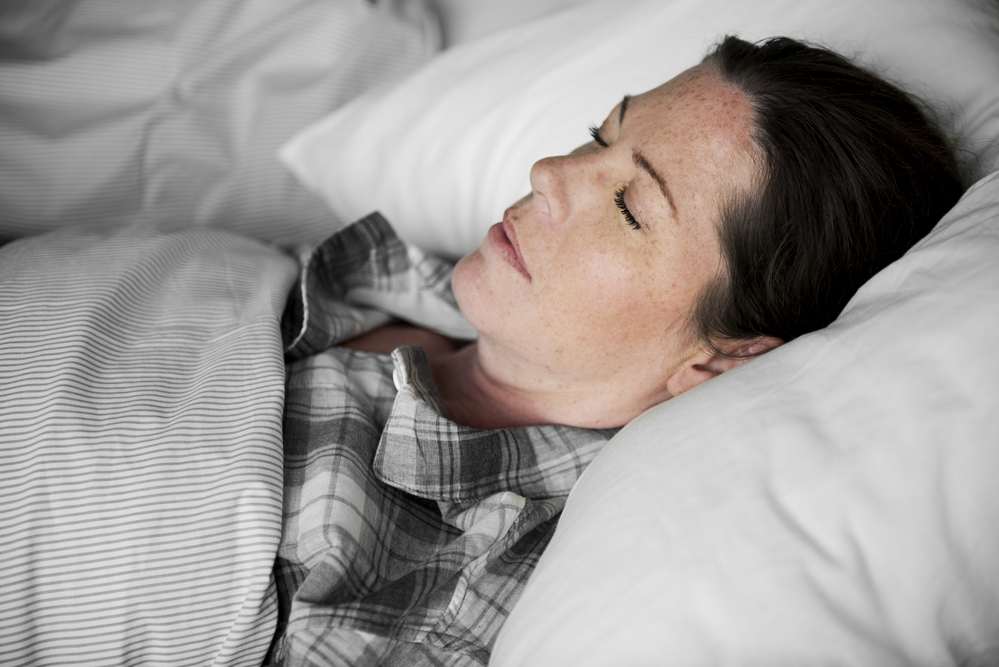Snoring vs. Sleep Apnea

Snoring is a common sleep issue, and can sometimes be more than just an annoyance to your partner. Snoring can sometimes be a sign of sleep apnea, but that isn't always the case.
If you're wondering whether you or your partner's heavy snoring is a sign of sleep apnea, here are a few quick tips.
Need Help Sleeping Better? Request our FREE Sleep Hygiene Guide.
Don't Dismiss Snoring as Natural
While many people snore, it's not a natural thing. When you snore, the muscles in your throat and nasal passage relax enough to cause blockages, which leads to the noisy vibrations we all know as snoring.
While some snoring is harmless, if you or your partner is a consistent, heavy snorer, there may be more going on there.
Related Content: https://thesleepshopinc.com/best-mattress-for-snoring/
How Do You Identify Sleep Apnea?
A doctor should always be the one to diagnose sleep apnea officially, but there are a few warning signs to let you know if you're at risk.
The first is loud, consistent snoring. This type of snoring is indicative of a constant blockage of your airways. This type of snoring isn't always mean you have sleep apnea, but just about everyone with sleep apnea snores loudly and consistently.
The second identifying factor of sleep apnea is being woken up by sudden gasps for air. People with sleep apnea can stop breathing while sleeping for anywhere from 10 seconds, to a minute or more.
If you're woken up by a sudden gasp for air, you've probably stopped breathing while you were sleeping, which is a strong sign you should get tested for sleep apnea.
Who Is At Risk For Sleep Apnea?
Sleep apnea can affect anyone, but there are a few factors that put you at a higher risk.
Middle-Aged Adults
The first is your age. Once you hit middle age, your thoat becomes narrower, and the muscles lose their strength. This is why sleep apnea is much more common in middle aged and older adults than it is among young adults, teenagers, and children.
Being Overweight
The second is being overweight. If you're overweight, you have more fatty tissue putting pressure on your neck. This makes it harder to keep your airwaves open and puts you at a significantly higher risk of developing sleep apnea.
Being on Medications or Drinking Alcohol
The third risk factor for sleep apnea is being on certain medications or drinking alcohol before bed. These can lead to muscle relaxation, which in turn leads to the airway blockages that cause snoring and sleep apnea.
Back Sleepers
If you're someone who sleeps on your back, you're putting extra weight on your throat, which makes it easier for your muscles to relax around your throat and lead to snoring or sleep apnea. If you can, try sleeping on your stomach or your side for a quick fix to this risk factor.
Closing Thoughts
Snoring is a sign of sleep apnea, but not everyone who snores heavily has sleep apnea. If you experience any of the risk factors mentioned above, it's a good idea to get tested.
Many people with sleep apnea have success using a CPAP machine while they sleep, and it might be a solution that's right for you.
Courtney is the reason The Sleep Shop exists. She’s a Seattle native with a passion for healthy sleep. She graduated from Seattle Pacific University with a major in marketing. She started The Sleep Shop to help friends and family choose a good mattress, and helped grow the site to what it is today. She does most of the product testing and reviews.
Learn More About Courtney

I didn’t know that snoring is not a natural thing and that the muscles in your throat and nasal passage are actually relaxing enough to cause blockages. My wife has been complaining recently about my snoring habit so I figured I’d look into it. I’m glad I found your article so that I can find sleep treatment services near me to stop the underlying cause of my snoring!
I didn’t know that middle-aged adults can be easily affected by sleep apnea because as you reach middle age, your throat becomes more constricted because of muscle strength loss. My friend assumes that he exhibits symptoms of insomnia, but I told him to cut the assumption until he gets to talk to a specialist. I’ll make sure to bring my friend to the nearest and most affordable hospital there is because he will use his own money for this initial check-up, then allocate budget for his possible treatment expenses since he wants to get cured as soon as possible.
It was good to learn that loud, consistent snoring a sign of sleep apnea. My husband snores every night very loudly. We will have to find a sleep clinic that can help treat this issue.